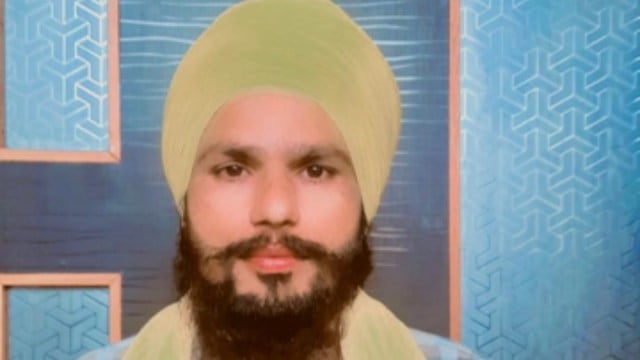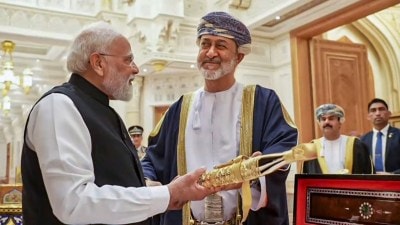For UAPA accused Sarabjit nightmare is over, but ‘life has not been so kind all these years’
Sarabjit had just returned from Bahrain in December 2020 and was arrested for “working to revive militancy in Punjab on behalf of Khalistan Zindabad Force (KZF) and planning to commit terrorist activities in Punjab” along with Amandeep Singh, alias Pinder, Gurdeep Singh, alias Baghi and Sanju Kumar. They were booked under the Unlawful Activities (Prevention) Act and the Arms Act.
 The police chargesheet against Kirat alleged that he, along with others, had conspired with Germany-based Prabhpreet Singh Sidhu to carry out terrorist attacks, targeting Hindu leaders and Punjab Police officers. It claimed their aim was to disrupt communal harmony and revive the Khalistan movement.
The police chargesheet against Kirat alleged that he, along with others, had conspired with Germany-based Prabhpreet Singh Sidhu to carry out terrorist attacks, targeting Hindu leaders and Punjab Police officers. It claimed their aim was to disrupt communal harmony and revive the Khalistan movement.
The wait for justice for Sarabjit Singh Kirat ended in four years. He was cleared of the Unlawful Activities (Prevention) Act he was booked for on January 2, but he was sentenced to two years in jail under the Arms Act. Since he had already spent four years in prison since his arrest on December 19, 2020, he walked out on January 18. But all these years, “life has not been easy for him and his family”.
“My mother died in February 2023, but I couldn’t get parole for her cremation. My family had lost confidence and resources to reach out to the court for my parole,” Sarabjit told The Indian Express. “I am a divorcee. My daughter was only six when I was picked up. I have returned home after four years, but she still fears that police will take me away from her.”
Sarabjit had just returned from Bahrain in December 2020 and was arrested for “working to revive militancy in Punjab on behalf of Khalistan Zindabad Force (KZF) and planning to commit terrorist activities in Punjab” along with Amandeep Singh, alias Pinder, Gurdeep Singh, alias Baghi and Sanju Kumar. They were booked under the Unlawful Activities (Prevention) Act and the Arms Act. Later, he was slapped with four more cases across different police stations in Punjab.
“I was taken to the Mall Mandi interrogation centre in Amritsar. I was tortured there and my hair was pulled. I was hit on the head with shoes. It still hurts. I didn’t know any of the co-accused in the case,” Sarabjit said. “During my custody, my family was not allowed to meet me. We had only a few meetings in the past four years. My mother would come to see me during my court hearings, but the police would push her away. She died when I was in jail.”
Police charge-sheet against Sarabjit reads, “The investigation has revealed that Germany-based Prabhpreet Singh, alias Sidhu, conspired in a planned manner with the arrested accused to carry out this terrorist attack aimed at disrupting India’s integrity and unity.
The targets included prominent leaders of Punjab and Shiv Sena, such as Harkirat Singh Khurana. Punjab Police officers such as Inspector Suba Singh, who were highly acclaimed for their work during the era of terrorism, were also marked as targets.
The main motive of the said targeted killings was to create discord between the Hindu and the Sikh communities in Punjab, to spark a communal conflict and to revive the Khalistan movement. Together, they planned to target police officers responsible for the sacrilege case at Bargari. Key accused Sarabjit Singh, alias Keerat, had photos in his mobile phone data of police officers like IG Parmaraj Singh Umra Nangnal, SSP Charanjit Sharma, retired Inspector Suba Singh, and Shiv Sena leader Harkirat Singh Khurana. These photos were sent by Prabhpreet Singh Sidhu from Germany to Sarabjit Singh.”
About the UA(P)A-related charges, Amritsar Additional Sessions Judge Baljinder Singh wrote in his judgment on January 2: “In this case, nothing was recovered based on such disclosure statements and the confession so recorded in those statements is not relevant and is not admissible in evidence. Therefore, accused persons cannot be convicted only based on such disclosure statements. In that way, there is not an iota of evidence against accused persons to connect them to the offences punishable under Sections 13, 17, 18, 18-B and 20 of the Unlawful Activities (Prevention) Act and thus, the accused persons are acquitted for such offences in the present case.”
Sarabjit and the other two were, however, convicted under the Arms Act for two years.
Human rights activist and lawyer Jaspal Singh Manjhpur said, “We will consider challenging the conviction under the Arms Act. The timing of his arrest was crucial. He was arrested when farmers were protesting on the Delhi border and efforts were made to project Punjab as a disturbed state. At that time the media had covered his arrest for his links with Khalistanis.”
“A total of five cases were slapped against him, but he was discharged in four cases,” he said.







